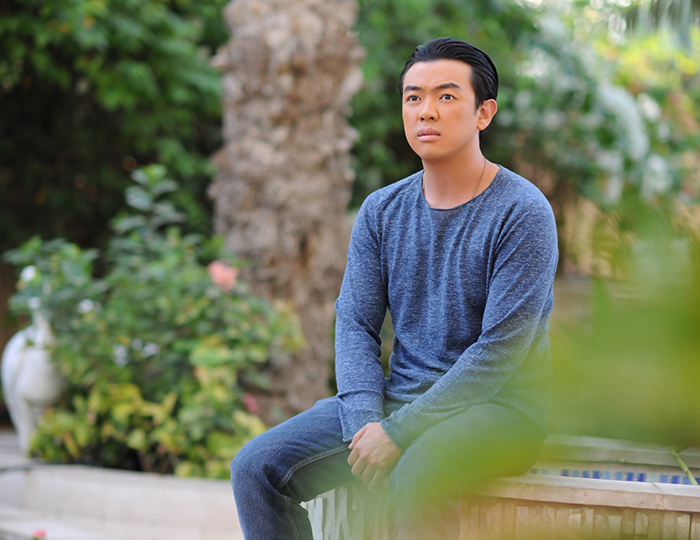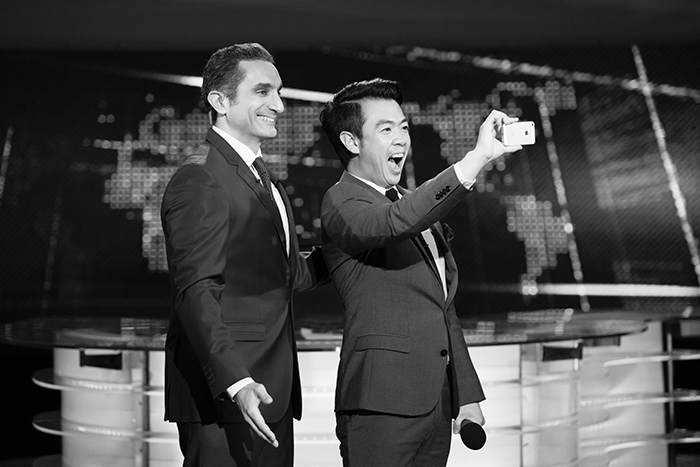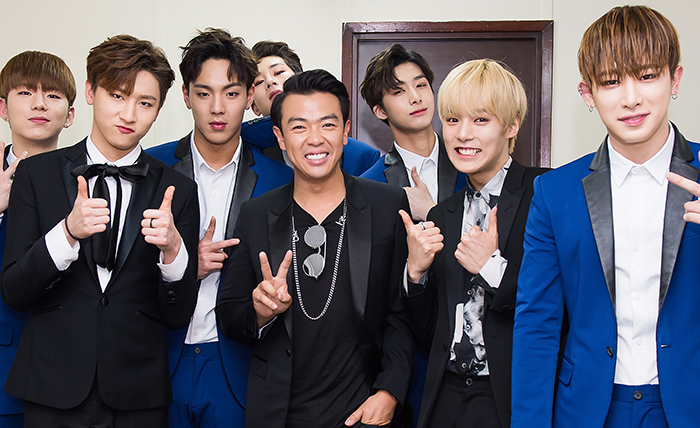View this article in another language
- 한국어
- English
- 日本語
- 中文
- العربية
- Español
- Français
- Deutsch
- Pусский
- Tiếng Việt
- Indonesian

Korean-Jordanian Wonho Chung rises to stardom and gains huge popularity among Arabic-speaking audiences.
By Korea.net Honorary Reporter Nuran Sami from Egypt
Photos = Wonho Chung
The Korean-Jordanian artist Wonho Chung has practically proved an unpopular and rarely-approached, yet valid, point. Simply put, it's the idea that you can be descended from a place toward which you hold a lot of respect, but also identify with a completely different place as your motherland. For Chung, it's what one feels in the heart that shapes him, regardless of race, language barriers or official papers.
With a distinct underrated philosophy peppered with devotion, and a firm disclaim of intermittence, Chung has embellished his way up to stardom and to sold out shows. He has spread himself far and wide, accomplished as he is, and prospered in building his name in a region that consists of raised eyebrows. He has turned that to his advantage, eyebrows, too, in a literal sense, and has raised amazement and has left audiences at a loss for words.
Chung's genuine cognizance of many entertainment paths drove him to master them all. The foreign yet deeply-rooted Korean-Jordanian is a multitalented media personality and has been, unsurprisingly, selected for an intense and intriguing TV show, alongside the "Cinderella of Gulf TV," actress Souad Abdullah. It's a role that many local figures are yet to set foot in. Prior to his breakthrough on Arabic TV, he was a host of his own segment, "Won on One," on ShowTime Arabia's "Show Me More," where he interviewed A-list celebrities, such as Vanessa Williams and Eva Longoria, and was loved by the stars. Moreover, Lebanese diva Nancy Ajram described him as "very unique and wonderful."
Wonho Chung is a standup comedian, TV host, talent show judge, actor, musician and honorary ambassador. He was born in Jeddah, Saudi Arabia, to a Korean father and a Vietnamese mother, and grew up in Jordan where he picked up proficiency in the Arabic language and social norms, making it eventually his native tongue and identity. He initiated his career in 2007 as a standup comedian in countries like Jordan, Egypt and the United Arab Emirates. It took him two full years to skyrocket his career from domestic in the Middle East to international, like Norway, the U.K., Canada and, his favorite city, New York.
Chung's exceptional indulgence in the Arab region, with a credible multicultural perspective, makes him undoubtedly the strongest bridge between Asia and the Arab world today.
The professional vocalist has marked his own territory in music by featuring in two songs so far that were well-received. They are "Laylitna" and a cover of "Mr. Simple," originally by Korean pop group Super Junior.
Chung's artistry has stretched past the cinema, with two roles in Arabic films. They were "February 30th" (2012) and "From A to B" (2014), and his first lead role alongside stars like Souad Abdullah and Shejoun Al Hajri in a Ramadan series "Saq Al Bamboo," which is based on the award-winning novel by Saud Alsanousi.
Chung is soon to prepare for season four of his travel show "Wonho Around the World" on channel Al Araby TV.
Personally speaking, Chung is one of the people you look at and wonder how many pages would be enough for his curriculum vitae. You wonder, "What did he not do?"
In a phone call with Korea.net, which Chung has gracefully spared time for, despite his busy schedule, the art prodigy walks us through his inspirational journey of phenomenal knowledge acquisition, dedication and achievements.

Wonho Chung is invited to appear on the comedy talk show 'Al Barname' by eminent Egyptian satirist Bassem Youssef.
How and when did you discover that TV was what you wanted to do for the rest of your life?
When I was as young as 3, I became fascinated with what artists do on TV. I admired seeing how they interacted with and influenced others, how they had the ability to provoke certain emotions and make you happy or sad. Also, my father was a great singer. My aunt was an opera singer and my cousins are great singers as well, and they play music. I have inherited such an artistic background from my dad's family and was really inspired by it. I used to also watch the Eurovision song contest and all the things in different languages that were presented.
You grew up exposed to many completely different societies and traditions. How did you manage to utilize that to your own favor in a balanced way and not fall victim to identity crises?
That's a very good question. I think the answer to that is that, as a person, you need to have the desire, the drive and the passion to overcome any obstacles that get in your way. Also, with comedy, you need to kind of dig deep into what makes you upset, what you struggled with growing up, to actually turn that into something positive. You need to always have a message.
In your opinion, what factors should standup comedians have to have a long-lasting career in the industry? What's the thin line between an amateur and a professional comedian?
That's a very good question. Let me start by saying that in order to have that in any field, you need to always improve by surrounding yourself with different people and environments. You need to always push yourself out of your comfort zone, as it pushes you as a creative artist. Be yourself. I get the script, and then I deliver it the way I want to as a TV presenter.
Do you think knowledge of psychology can contribute to a better standup performance in order to determine the right spots to trigger people's laughter or way of thinking?
Absolutely. Whether you're doing it consciously or subconsciously, you need to have a better understanding of people and their psyche. If you don't have that skill, you won't be able to communicate your jokes. That's why everything I do starts with the audience. Whenever I have TV stations or production companies to talk about a new show, I always tell them, "Guys, start with the audience, and then take steps backwards in the process."
So you separate between the person and the persona.
Exactly. You need to be able to analyze every situation in order to be successful. Once you're an artist or a comedian, you're always trying to unlock the psychology of people or of an audience of 500 or even 15,000 people.

Wonho Chung poses for a picture with the pop stars Monsta X at KCON in Abu Dhabi.
Jumping right to Korean pop music, you did a splendid cover of "Mr. Simple" in 2013. Do you have a favorite Korean pop act to whom you actively listen?
You know what? The whole "Super Junior K-pop Mr. Simple" thing is really funny. I'm sure you're a K-pop fan, aren't you?
Yes.
You sound like a K-pop fan. You know what? I had a passing interest in K-pop, but I wasn't a diehard fan that knew all their albums or anything. By complete coincidence, I met Alaa' Wardi. However, I really, really like Ailee. I met her at KCON Abu Dhabi a couple of years ago. I was backstage hanging out with her, Monsta X and BTS. It's funny because none of them speak English except for her, so we ended up having a long conversation. At that point, I had never heard her sing until I introduced her onstage and she performed. I was, like, "Oh! She sings like it's nobody's business!"
Can you share your biggest challenges while filming "Wonho Around the World"?
I'm glad you asked that question. We're so privileged to travel around, but the biggest challenge is being tired. It's such a hectic schedule. Sometimes, within one day, you could be in three different cities. People also tend to forget that there's a person behind the camera. If I'm climbing a mountain, the film crew is climbing with me. You're always going from one climate to another and trying to not get sick. At the end of the day, it's a job. Of course you enjoy it, but you have to take care of the job that you present on TV.
Congratulations on having mastered your first leading role in "Saq Al Bamboo," which was immensely applauded. How did you feel about taking such big role on the Arabic screen?
I never thought it'd ever happen. The production company owner, Amr Alsabbah, called me for the interview and gave me the book. I think I finished it in a week when I was so busy and traveling so much for different shows around the Gulf and I just couldn't put the book down!
I went on set and met amazing people like, of course, Souad Abdallah, and I think we needed that strong team, as we were put under so much pressure. It was a series for Ramadan, and Ramadan had started while we were still filming. More than 90 scenes of mine were in Tagalog, so it was a huge task for me to not just learn a new language, but to learn to act in it, too.
Having accomplished it and worked your way up to the top, what's next for you?
I've been so blessed to be able to do so much in the past 10 years I've been active in the Middle East. It's been so rewarding, so I'm truly grateful and humbled.
I would also like to see what I can do in Hollywood. I think this is the time when Hollywood is giving more opportunities to diversity. Last year at the Oscars, we had the biggest number of nominees from African ethnicities or cultures. This year is about Latinos and Hispanics. You know the director who won for "The Shape of Water"? There's a strong sentiment toward Mexico. I think now East Asian actors are next, as a lot of East Asian actors have been misrepresented and stereotyped. A good friend of mine, Donny Yen, has been doing such an amazing job breaking through in the U.S. market. He's been in "Star Wars" and is currently doing the movie version of "Mulan," so it's very promising and it's time for me to at least explore.
wisdom117@korea.kr
* This article is written by a Korea.net Honorary Reporter. Our group of Honorary Reporters are from all around the world, and they share with Korea.net their love and passion for all things Korean.